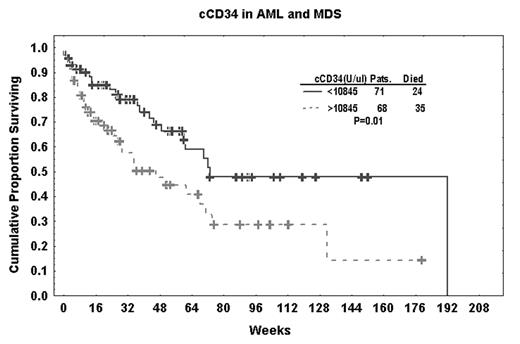Abstract
CD34 is an approximately 116-kd glycophosphoprotein expressed in hematopoietic progenitor cells, endothelial cells, and some mesenchymal and neural cells. CD34 is a typical adhesion molecule capable of inducing the cell signal transduction pathway leading to adhesion and differentiation. We used a newly developed bead-based assay to measure cell-free circulating CD34 (cCD34) in the plasma of patients with acute myeloid leukemia (AML; n = 98) and myelodysplastic syndrome (MDS; n = 50). Levels of cCD34 were significantly higher in AML (median 10983, range: 844–100,4191 U/10 μl than in MDS (median: 8749, range:102–791,350 U/10 μl) patients (P<0.01). cCD34 levels were higher among patients with high-risk cytogenetic abnormalities in AML (P = 0.01) but not MDS (P = 0.92). When grouped together, AML and MDS patients with cCD34 levels higher than the median (10,845 U/μl) had significantly shorter survival than those with lower levels (P = 0.01). This association was independent of cytogenetic grouping, age, and performance status. cCD34 levels did not correlate with percent of blasts or CD34+ cells but did correlate with WBC count (R = 0.36) in patients with AML, suggesting that cCD34 reflects the overall leukemia load. Although further study is needed for confirmation, cCD34 appears to result from turnover of leukemic cells and may affect the activation of certain pathways, therefore influencing survival and clinical outcome.
Disclosure: No relevant conflicts of interest to declare.
Author notes
Corresponding author


